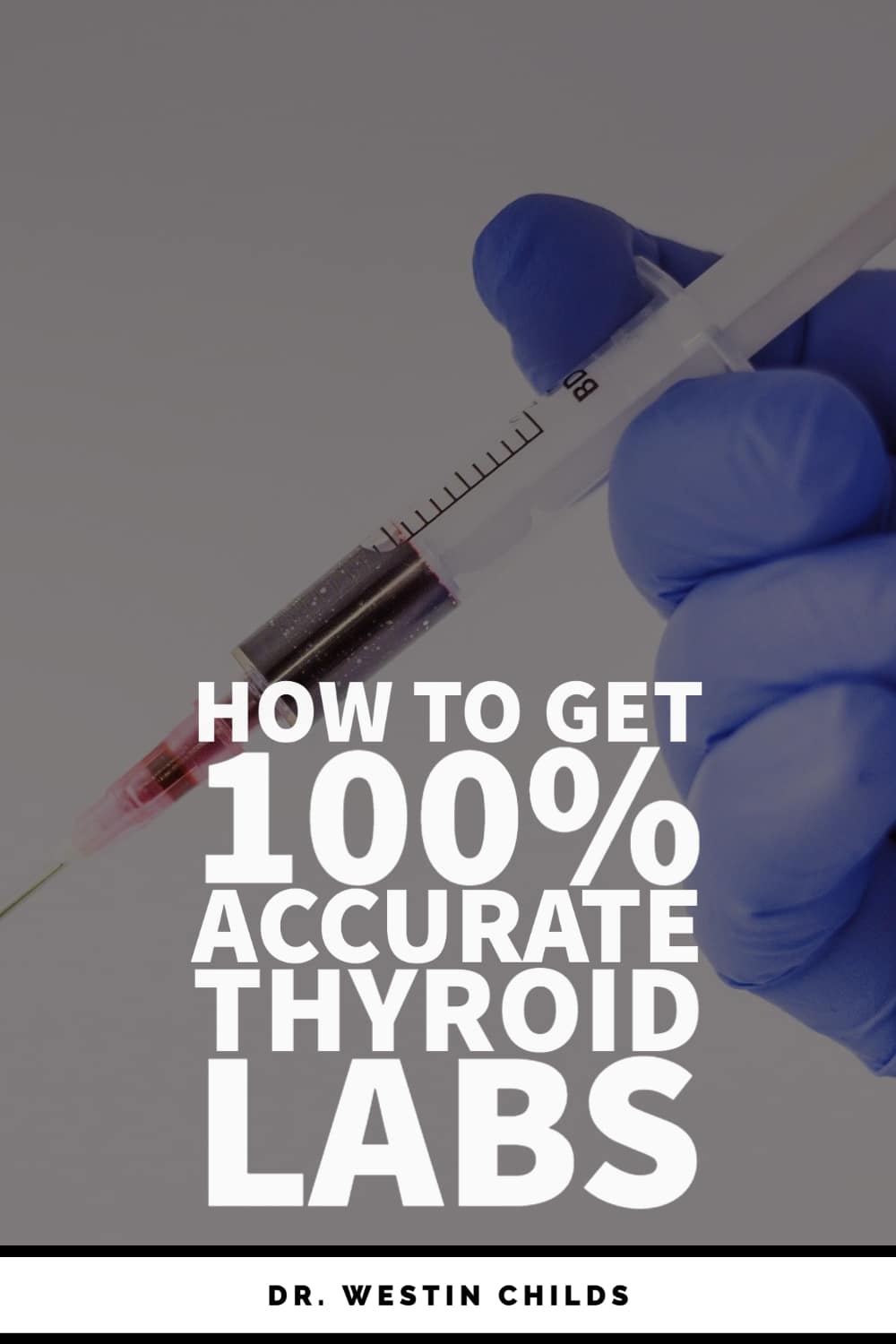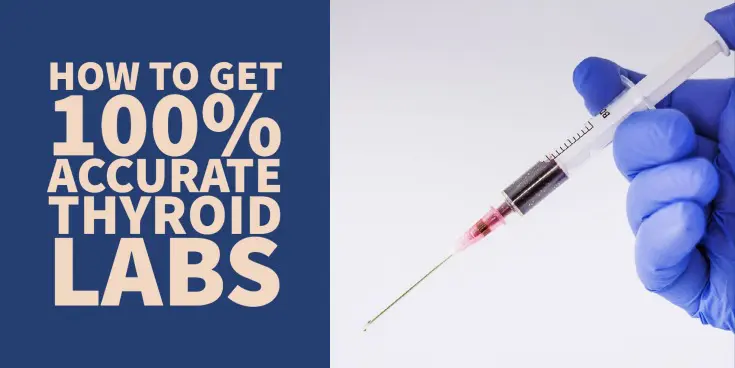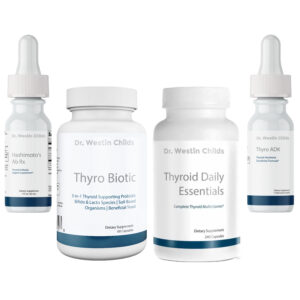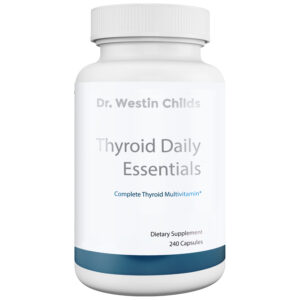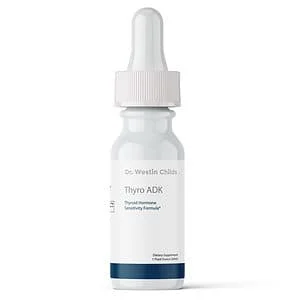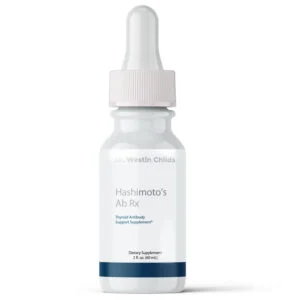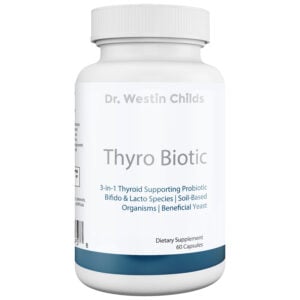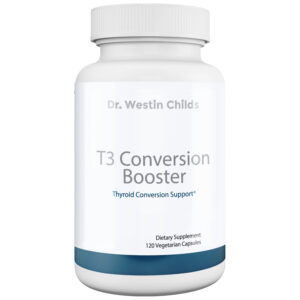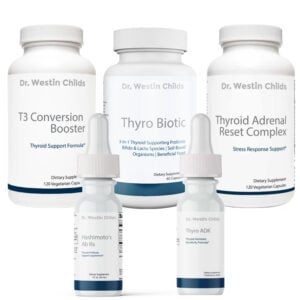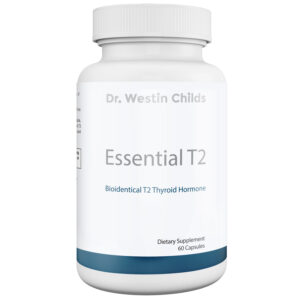100% Accurate Thyroid Lab Tests – Why it Matters
It should come as no surprise to you that you would want your thyroid lab tests to be as accurate as possible when it comes to evaluating your thyroid, right?
I don’t think anyone would argue on that particular point.
But what is interesting is that most doctors don’t seem to understand some of the more basic things that can interfere with thyroid lab testing.
And with our current climate of undertreated and unhappy thyroid patients (as evidenced by thousands of patients in surveys and studies such as this one (1)), wouldn’t it make sense to make sure that our testing is not only reliable but accurate?
The truth is simple:
If you don’t get an accurate evaluation of your thyroid with your lab tests then how on earth are you going to reliably make changes to your thyroid medication dose?
How will you know if you are on the right track? How will you know if you should increase your dose or decrease it?
All of these topics, especially with the reliance upon simple thyroid tests by conventional doctors, should cause you to be very concerned about the accuracy of your thyroid lab tests.
What you may not realize is that there are many factors that can negatively impact the accuracy of these labs including when they are drawn, what time of day they are taken, whether or not you are fasting, when they are drawn in relation to when you took your medication and more.
And you, as a thyroid patient, should be aware of these factors because the chances are high that your doctor isn’t!
DOWNLOAD FREE RESOURCES
Foods to Avoid if you Have Thyroid Problems:
I’ve found that these 10 foods cause the most problems for thyroid patients. Learn which foods you should avoid if you have thyroid disease of any type.
The Complete List of Thyroid Lab tests:
The list includes optimal ranges, normal ranges, and the complete list of tests you need to diagnose and manage thyroid disease correctly!
7 Steps to Ensure that your Lab Tests are Reliable
If you are new to the thyroid game then be sure to read through this article slowly (you may have to read and re-read it to let it sink in) because following these rules will allow you to get the most ACCURATE results possible on your lab tests.
What if you’ve done some of these things but not all of them?
My recommendation is to follow all of these rules for at least one set of thyroid lab tests.
This set of labs will then become your baseline which you can accurately compare future lab tests.
With this in mind, let’s talk about how to accurately check your thyroid lab tests and what you should (and shouldn’t) be doing…
#1. Get the full thyroid lab panel.
Your first step, if you are serious about testing your thyroid accurately, is to get the COMPLETE thyroid lab panel.
Many patients (and you might be included in this group) have never actually had this complete set of thyroid lab tests.
They are often surprised to know that there are thyroid tests that exist outside of the typical TSH and free T4.
The reason for this is complicated and has to do with the fact that most doctors don’t think that these other tests are necessary.
I disagree with this notion for many reasons but probably the most pressing issue is the simple fact that so many thyroid patients are suffering despite receiving ‘treatment’.
How can you base treatment on an incomplete picture and why wouldn’t you order all of the tests available for the thyroid if you can?
The concept that you need to test more than just the TSH may be foreign to many of you but it’s incredibly important.
The complete thyroid lab panel that you need to get includes:
- TSH (thyroid-stimulating hormone)
- Free T3
- Free T4
- Total T3
- Reverse T3
- Thyroid antibodies (both TPO antibodies and thyroid peroxidase antibodies)
- (Optional) Cortisol
- (Optional) SHBG
I’ve included two additional optional tests above that I like to order on every patient but they are not always necessary (I just find that they provide extra information which can be helpful).
If you are not getting this complete thyroid lab panel then you are doing something wrong.
The only way to understand how thyroid hormone is being processed in your body, how you are utilizing thyroid medication (if you are taking any), the underlying cause of your thyroid disease, how well your body is converting, and more, is to get this complete lab test.
If you only order the TSH you will be in the dark regarding the other important metrics I’ve just mentioned.
ALWAYS start with this complete lab panel.
It may not be necessary to order each and EVERY time (though it may be for some of you), but you should at least have this complete set as a BASELINE set of labs that you can refer to for future lab tests.
If your current doctor isn’t willing to order these tests then you may need to seek out a more knowledgeable thyroid doctor to help (you can download my tips on how to find a good thyroid doctor here).
#2. Check your labs at 8:00 am.
The next thing you should ensure is that you get your labs tested at 8:00 am in the morning.
The reason for this is that your thyroid hormone PEAKS first thing in the morning (along with other hormones in the body).
You should also be aware that thyroid hormone levels FLUCTUATE throughout the day (2) based on a number of factors such as how awake you are, how active you are, if you are sick, and so on.
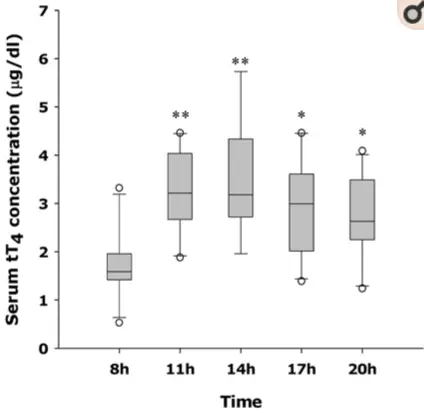
Because of this, you need to remain consistent in the time of day that you check your thyroid lab tests so that you can compare previous lab tests to your more recent lab tests.
If you get one of your tests done at 2:00 pm and then the other done at 9:00 am, for instance, then you are not allowing for an equal comparison.
I typically recommend that lab tests are ordered around 8:00 am in the morning because this is the time that cortisol levels also peak (3).
And you will probably recall that I mentioned you should check cortisol along with thyroid function but I didn’t tell you why.
The reason is that thyroid hormone levels and cortisol levels work in tandem with one another such that cortisol problems can mimic thyroid problems and vice versa.
I always check cortisol and thyroid hormones together to ensure that we look at both variables.
You don’t always have to do this (though I would recommend it) but you should ALWAYS get your thyroid labs tested first thing in the morning preferably around 6:00 to 9:00 am.
Do not get your labs tested any later or earlier as this may impact your results and make them look worse than they really are.
#3. Check your thyroid lab tests in the fasted state.
Another question that many thyroid patients have is whether or not they should get their labs tested in the fasted state or not.
If you’ve had your labs tested recently you know that there are certain tests which you should be fasting for.
Tests such as cholesterol (4), triglycerides, insulin, and blood sugar all required a fasted state to allow your doctor (or you) to interpret them correctly.
But you should also add thyroid hormone to this list.
Why?
Because the consumption of food (and this includes coffee), has a tendency to impact your thyroid values!
Remember:
Your thyroid controls the majority of your metabolism. When you consume food you are telling your body to turn on that metabolism.
So if you check your thyroid after you’ve eaten a big meal then your thyroid will be stimulating more than it would be in the fasted state.

In addition, food can interfere with thyroid medication (5) (if you take them together) which can also negatively influence your thyroid lab tests and accuracy.
We will talk more about thyroid medication timing below.
Another reason to avoid food is that you should ALSO test your cholesterol at the same time as your thyroid.
The reason for this is simple:
High cholesterol is an early marker of sub-clinical hypothyroidism (and even overt hypothyroidism (6)) that shouldn’t be ignored.
So you can use your cholesterol level as a roundabout way to confirm the presence of hypothyroidism.
You can also use cholesterol to determine if your thyroid medication and dose are working!
As you take thyroid hormone you should see your cholesterol go down.
#4. Check your labs BEFORE taking thyroid medication.
Another common question I get is how to get your thyroid labs tested when you are currently taking thyroid medication.
Do you take your medication and then get your labs drawn?
Do you wait 24 hours after? Does it even matter?
So let’s take a second and talk about this topic.
The short answer is that YES it matters (quite a bit actually) when you take your thyroid medication relative to when you get your labs drawn.
What you should aim for is getting your thyroid labs tested about 23.5 to 24 hours AFTER your last dose of thyroid medication.
The timing matters here (which is why consistency is so important for both taking your thyroid medication and for getting your labs tested).
Ideally, you would want to take your thyroid medication around 7:00 am each morning.
This would allow you to get your labs drawn at 7:00 am BEFORE taking your thyroid medication.
Once you get home from your lab tests you can then take your normal dose.
Yes, it will push back your daily dose by about an hour or so but it will be worth it.
If you take your thyroid medication every morning at 7:00 am and if you get your labs tested at 7:00 am the following morning, your lab tests will tell you what is happening in your body about 24 hours after your last dose of thyroid medication.
This 24-hour period marks the lowest level of thyroid hormone in your body right before you take your next dose.
And this is important because then we know what the absolute lowest level of thyroid hormone your body is able to handle (because once you take your next dose your thyroid hormone levels will shoot up).
If you get your labs tested any later (or any earlier) then you simply don’t have a clear picture and your most recent dose of thyroid medication will interfere with your lab tests.
And, as I mentioned previously, you should try to get future labs tested around the same time.
Stick to this schedule as close as possible for the best results.
#5. Don’t test your thyroid on days 10-20 of your menstrual cycle.
Another less common factor, but still important, has to do with your menstrual cycle.
This is obviously only important to women who are menstruating!
This means if you are menopausal (for any reason), if you are a man, or if your cycle is not regular, you do not need to worry about this.
But, if you are having your cycle somewhat regularly then you need to pay attention to your cycle and what day of your cycle you are on when you get your thyroid labs tested.
Why does it matter?
Because during your cycle your estrogen and progesterone levels will fluctuate up and down.
And progesterone, in particular, has an effect on thyroid hormone levels such that it may invalidate your thyroid lab tests if you get your labs tested when progesterone is at its peak.
And it tends to reach high levels on days 10-20 of your menstrual cycle (7).
So you will want to avoid getting your thyroid labs tested on these days.
You can safely get your labs tested on days 1-10 or days 20-28, but you should avoid anywhere in between.
If you fail to take this into account your thyroid labs may look better than they really are because progesterone tends to have a positive impact on thyroid function.
If you go by this false data you may inadvertently be underdosed by your doctor or physician.
#6. Avoid taking Biotin prior to your thyroid lab tests.
Another big thing to watch out for is biotin!
Biotin is a nutrient/vitamin which is often used to treat hair loss and to help hair growth.
But there’s one big problem with biotin:
It interferes with the thyroid hormone lab testing assay!
Don’t let this confuse you, though.
What happens is this:
If you have biotin in your system or in your blood then the biotin in your blood may cross-react with the tests that labs use to test for thyroid hormone (8).
If this occurs then your lab tests will look more hyperthyroid than they really are.
This effect is so profound that it can actually make a normal healthy person look hyperthyroid and it can make a hypothyroid patient on thyroid medication appear like they are overmedicated.
But it isn’t real hyperthyroidism.
It’s just interference with the lab test itself.
But you can imagine your doctor dosing you based on this inaccurate lab test due to biotin interference.
They would be inclined to REDUCE your dose of thyroid medication when you may actually need more.
I’ve found that many thyroid patients don’t even know they are taking biotin as it is often found in high doses in multivitamins and in hair growth complexes.
And thyroid patients will often try to use hair-promoting supplements because hypothyroidism causes hair loss.
Avoiding biotin for a few days BEFORE your lab tests will ensure that you do not have this issue.
If you are taking biotin, for any reason, you should check out this article which provides much more detail on how biotin interferes with thyroid lab tests.
#7. Don’t recheck your lab tests more frequently than every 6 weeks.
This topic has more to do with what to do after you’ve had your labs tested but it is still important.
What you need to know here is that you should not get your labs tested more frequently than every 6 weeks.
I see many thyroid patients who are anxious to feel better who pull the trigger and get their labs tested much more frequently than the recommended 6 weeks.
The problem here is that it not only takes 6 weeks for your thyroid hormone levels to reach equilibrium after adjusting your dose but that repeat lab testing this early doesn’t provide any meaningful information.
The only lab tests which may be somewhat helpful are your free thyroid hormone levels and even this is debatable.
In addition, you are not likely to feel any different because of the lag time between how thyroid hormone influences your clinical symptoms (which takes weeks) and how this is reflected in your thyroid lab tests.
You could very well pull the trigger on getting your labs tested 2 weeks early (at the 4-week mark) and make changes to your medication regimen based on these inaccurate results!
This may lead you to make the WRONG decision about your treatment and set you down the wrong path when if you would have waited a few weeks you wouldn’t have had this issue.
You need to think in terms of months (not days or weeks) when it comes to treating your thyroid.
And this concept applies to changes in the supplements you take, changes to your diet, changes to your thyroid medication, and so on.
You simply won’t see (it happens but it’s rare) immediate changes to thyroid function by doing these things.
Final Thoughts
I hope you found this information helpful!
I think if more people knew about how to accurately test their thyroid they would be on a better path to feeling better.
If you have never had any of these things done then make sure you follow all of these rules so you can get a great set of baseline lab tests.
Not every step above needs to be followed for each subsequent lab test but you should absolutely follow all of them for your first go.
Once you have a solid baseline you can then compare future lab tests to it.
Now I want to hear from you:
Do any of these rules surprise you?
Did you already know about all of them?
What changes are you going to make for your next thyroid lab tests?
If you’ve already tried them and have noticed a difference please leave your comment or share your experience below!
You can also leave any questions you might have as well.
